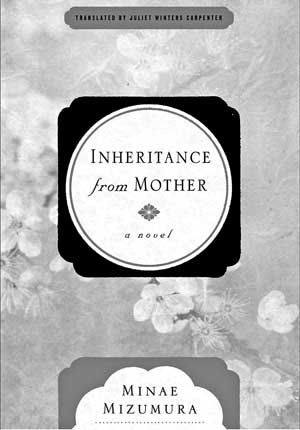Thursday Feb 26, 2026
Thursday Feb 26, 2026
Saturday, 13 May 2017 00:00 - - {{hitsCtrl.values.hits}}
By Ann Bauer
The Washington Post: At 51, I’m committed to the idea that I don’t want to live if I’m a burden to my children. To that end, I have a widely distributed living will, decision-makers who understand my stance and an age at which I plan to discontinue diagnostic tests.
My mother, vibrant and hopeful at nearly 80, eyes me. “Let’s see how you feel when you’re my age,” she says.
Ours is a tension between generations: hers the victorious World War II babies who marched into a world of prosperity, naming themselves the Greatest Generation; mine the motley Generation X, ambling in bleakness and clinging to adult life through a string of economic woes.
I would have thought this was a uniquely American dynamic. But Minae Mizumura’s gorgeous and intimate novel, “Inheritance from Mother,” paints the conundrum bright — both specifically, as a Japanese issue, and universally, as the developed world’s aging population explodes.
In a 2014 op-ed in the New York Times titled ‘Please, Mother, Enough,’ Mizumura explained that “the myth of the selfless mother has a strong grip on Japanese heartstrings.” To honour one’s mother is seen as a virtue, and “to strive to extend her life by even one day is a solemn duty.” Japanese women who live to 90 or even 100 are often seen as the ideal of health and happiness.
“Inheritance from Mother” has a very different story to tell.
Mitsuki, the heroine of Mizumura’s novel, is a frail, fretful woman in her mid-50s. She is lonely, childless, underemployed (as an adjunct professor) and caring for Noriko, her querulous, hedonistic, elderly mother who has fractured a shoulder and hip. Mitsuki’s older sister, Natsuki, is flighty and artistic; she married into wealth and assumes little responsibility. Mitsuki has not disclosed to either her mother or her sister that her rock-star academic husband, Tetsuo, is on his third and most flagrantly obvious affair. On the very day Mitsuki finds evidence of the other woman, the hospital calls. She rushes there to find her mother lying in bed and wailing in fear. A surgeon stops by to explain the procedure where they will implant new, artificial bones. But, he warns, Noriko will no longer be able to walk.
“It might be a good idea to keep a portable toilet beside her bed,” the doctor says. With this, Mitsuki knows her life is as good as over until her mother is dead.
Originally published in 2010 and 2011 as a serial novel in the Yomiuri Shimbun, Japan’s most widely read daily newspaper, “Inheritance from Mother” went on to win the Osaragi Jiro Award. The English edition, translated by Juliet Winters Carpenter, has been named an O Magazine Reading Room selection for July. One of the most entrancing things about this novel is that it retains the rhythm of a serial even in bound-book form. The book is divided precisely into two parts, each with 33 vignettes and chapter headings such as “A Husband Sipping Aged Sake” or “The Night the Sky Rained Stars.”
Mizumura’s writing is urgent yet thorough, and her plot — with its multiple divorces and infidelities, scheming, legends and deaths — just short of overwrought. But her prose is controlled and as dense as poetry. Here, she writes about the dank extended-care hospital where her father spent his dying days: “Dressed in pajamas much alike, males and females indistinguishable, they wove their way around in wheelchairs, drifting up and down the corridor like living ghosts.”
Part 1 begins with Mitsuki “exhilarated, knowing that her mother was finally dead.” Then it reels back to show her scrambling from a philandering husband to a bed-bound mother obsessed with her bowels. Mitsuki’s tedious middle-aged life is drawn one tableau at a time. She was the lesser of two girls, not as talented as her sister, devoted to the father their mother spurned for a younger man. Suffering from a malady she calls air-conditioningitis, Mitsuki experiences her mother’s demands as “heavy, sticky filaments that dulled her skin as well as her heart.” The prose here is beautiful but sometimes plodding, largely focused on establishing character and events.
In Part 2, after Noriko’s death, Mitsuki sheds the filaments and begins to bloom. Whereas she was exasperating before, now she begins to interrogate her own part in the drama. Could her refusal to work full-time have damaged her marriage? Might the rabid resentment of her mother be hiding other disappointments? Could her decision not to have children backfire in her own old age?
This section is far more languid, with meditations on azaleas, architecture and “bovarism,” the romantic practice of escaping real life by focusing on impossible dreams. There’s a gratuitous mystery involving a psychic and a suicide at a mountaintop resort. Part 2 is a wandering, sometimes frustrating sequel to the very straightforward Hemingwayesque quality of Part 1. Yet so worth it. The resolution of “Inheritance from Mother” is natural and satisfying in myriad ways.
Here is the sentence that stopped me: “Perhaps her mother’s rejection of old age had made Mitsuki too ready to embrace it.”
This is a breakthrough for Mitsuki, who gracefully accepts her regrets and missteps and builds a whole new life. But I believe my own mother would say there is wisdom here for the rest of us, as well.
(Bauer is the author, most recently, of the novel ‘Forgiveness 4 You’.)